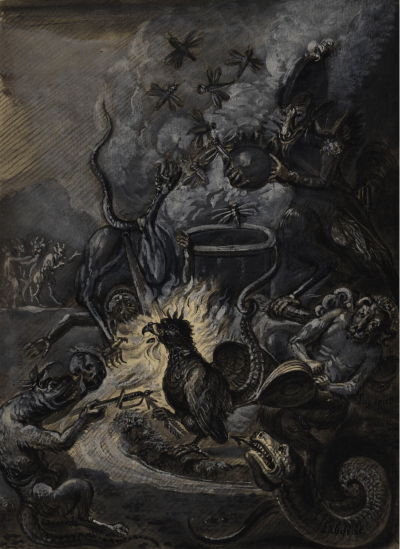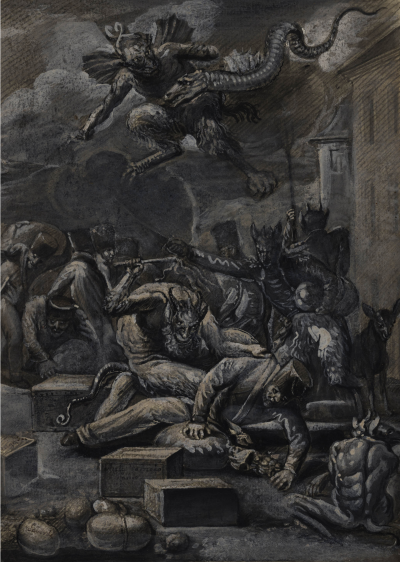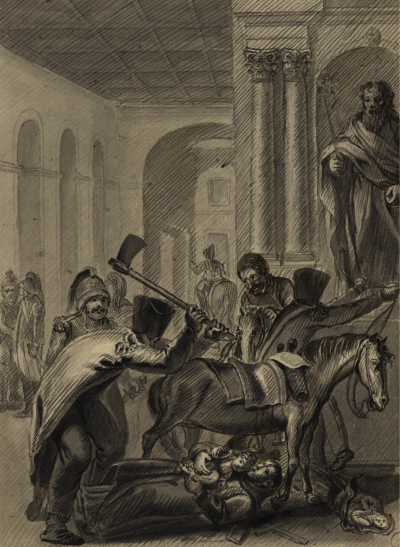THE 1st INVASION



“1807
8 December, on this day a French Division composed of Infantry, Cavalry and […] Artillery reached Mafra […] and set up their Headquarters […].”
The French reached Mafra just 10 days after the Royal Family had fled to Brazil. The set up their headquarters in the Palace and the Convent (with officers staying in private homes).
Now began a dark period in the town's history where hunger and misery reigned.
“The war feeds itself” was the French army's motto. This logistics system said that the conquered lands were responsible for feeding the conquerors. They restocked locally through requisitions without any payment date, in other words, for free. And for nine (interminable) months Mafra supported the supplies to the French headquarters.
During the occupation, the Tapada de Mafra hunting estate was used as a goods warehouse to provide beef, game, vegetables, cereals and firewood, the latter of which was needed to cook the meals, bake bread and heat the soldiers.
This firewood became a cause for one of the most emblematic moments in the Portuguese resistance:
Jacinto Correia, who lived in Mafra, was carrying bundles of wood when two French soldiers tried to steal it. He not only resisted, but he also killed them both immediately. He was tried, sentenced to death and put in front of a firing squad beside the palace.
Junot, fearing a popular revolt, made an example of the man to show his justice and absolute power.
Perpetuating the memory of this event is a way of paying homage to this hero, so his final sacrifice was not in vain…
Until his last breath, he repeatedly shouted a phrase that became famous and triggered a revolt:
“If you were all like me,
not a single Frenchman would remain alive!”
The despair and misery were not limited to Mafra, they covered the whole of Portugal. The fine of 40 million 'cruzados' imposed on the Kingdom of Portugal by Junot, the confiscation of gold and silver from the churches, the profanation of churches and disrespect for human life were immortalised by the painter Cirilo Volkmar Machado. In a series of 17 drawings, he satirically and violently comments on Junot and his army, inserting his fierce criticisms into the French general's edicts. It is his voice you hear now:
“Open well of the abyss, Infernal Furies rising up inside, their great advice, against Portugal.
Corsican Napoleon striving to conquer the universe […] his infamous progress against Portugal.
Portuguese remain calm and trust us.
Junot. Decree of 12 May 1808
In proper Portuguese, this means: we came here just to kill you, dishonour you, rob you: but this is only to fulfil our desire. So be calm."
Cirilo Volkmar Machado [adapted]
“Junot, the perfidious Junot in compensation for the many favours that were voluntarily done to you in Portugal, you deigned to torment the Portuguese with a tribute of 40 million cruzados.
[…] The ungodly Junot, not satisfied with the tribute he had imposed […], added that the churches would also be pillaged by the right of the force with which they were emptied.
All the Gold and Silver of all the Churches, Chapels and Brotherhoods will be taken to the mint.
Junot. Decree of 01 February 1808."
Cirilo Volkmar Machado [adapted]
“The abominable soldiers of Napoleon sacrilegiously stain the Temples of God, with atrocious insults. They despise the Holy Images, they break them and throw them in the fire…
The Religion of your country, the same one we all profess... will be protected and aided by the same will.
Junot. Edict of 1 February 1808
Great Aid, great protection for Religion, they threw the Holy Images into the fire. Lovely phrase."
Cirilo Volkmar Machado
“1808
2 September, The British army entered Mafra this morning in pursuit of the French, they were welcomed with great joy and the bells and carillon rang out as they passed.”
The British army landed at Lavos (Figueira da Foz) on 1 August 1808 under the command of Lieutenant-General Arthur Wellesley (the future Duke of Wellington).
He arrived victorious at Mafra on 2 September after the battles of Roliça and Vimeiro.
Like the French, he set up his headquarters in Mafra Palace.
Guided by a different logistics system, they also used requisitions, but there were paid (with delays or without).
The Tapada de Mafra is also, likewise, used. The collect oxen and mules to transport their supplies. It is also transformed into arable land where some soldiers plant vegetables.
However, the structure of the allied army is different from that of the enemy. Loads of supplies periodically arrive from Britain by sea and then carried on ox wagons.
On 15 September 1808, after signing the "Convention of Cintra" (a deal allowing the Napoleonic troops to take all their equipment and 'personal property'), Junot and his army embark, leaving Portugal.
This decision gave rise to the expression to leave "arms and bags" since that was how the French left with their bags full of looted items, a heritage that disappeared forever!
The event marked the end of this Invasion... but others would follow!
“The French Eagles and Cockerels pierced by the British arrows, serenity brought back to our Hemisphere, Lusitania raised up by Britain. Tranquillity abundantly becoming us.
Lusitania aided in its lethargy by the valiant Hercules of Britain. Peace reigns again.
Portuguese, be courageous. Peace for the good and peace for the evil."